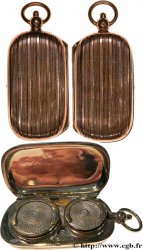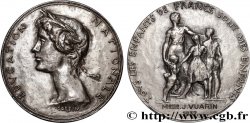fme_584652 - III REPUBLIC Médaille parlementaire, Théodore Steeg
无库存.
所有在网站上销售的产品 (2022)
价格 : 300.00 €
所有在网站上销售的产品 (2022)
价格 : 300.00 €
种类 Médaille parlementaire, Théodore Steeg
日期: 1906
铸币厂名称/城市 75 - Seine
材质 silver
直径 49,5 mm
模子方针 12 h.
硬币制模工 F. VERNON
重量 61,59 g.
侧面 lisse + corne d’abondance ARGENT
印模 corne d’abondance ARGENT
稀少度 R3
关于品相的说明
Patine grise hétérogène avec des marques d’usure sur les hauts reliefs. Présence de petites rayures dans les champs. Traces de manipulation
正面
正面的文字 REPUBLIQUE - FRANÇAISE.
正面的说明书 Buste de la République à droite, portant une couronne de laurier sur un bonnet de la liberté ; en bas à droite F. VERNON.
背面
背面的文字 CHAMBRE DES DEPUTES - 1906 // STEEG / SEINE.
背面的说明书 Allégorie de la loi debout à gauche devant l’allégorie du suffrage universel, assise, tendant sa main droite devant un drapeau ; millésime à l’exergue sous la base d’un socle portant l’urne électorale gravé : SUFFRA / UNIVERSE, signé : F. VERNON.
评论
Médaille attribuée en 1906 à Théodore Steeg député de la Seine.Fils de pasteur il naquit le 19 décembre 1868 à Libourne (Gironde). À la fin des années 1890 il s’engage en politique. En 1897, il fonde l’Union populaire. Il est élu député en juillet 1904 puis fut réélu en 1906 et 1910. En 1914 il abandonne l’Assemblée nationale lorsqu’il est élu sénateur de la Seine. Il fut nommé ministre de l’Instruction publique et des Beaux-Arts (2 mars 1911-13 janvier 1912). De 1912 à 1913, sous Raymond Poincaré il fut ministre de l’Intérieur. En avril 1925 il a été nommé ministre de la Justice et il exerça d’autres mandats ministériels. En 1940 il s’abstint lors du vote accordant les pleins pouvoirs au maréchal Pétain. Il se retira de la vie politique en 1945 et décéda à Paris le 19 décembre 1950.








 对产品描述纠错
对产品描述纠错 打印
打印 分享我的选择
分享我的选择 提问
提问 Consign / sell
Consign / sell
 产品介绍
产品介绍



